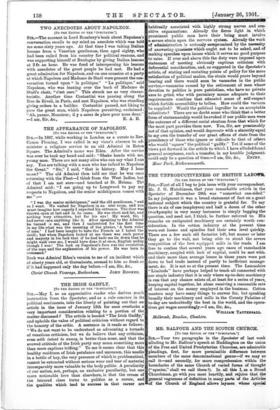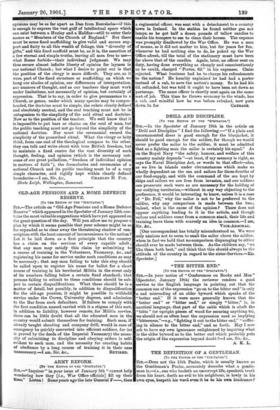MR. BALFOUR AND THE SCOTCH CHURCH.
[To THE EDITOR OP THE "SPECTATOR."] Sin,—Your two paragraphs in the Spectator of last week alluding to Mr. Baliour's speech at Haddington on the union of the Free and United Presbyterian Churches, are admirable pleadings, first, for more permissible difference between members of the same denominational genus—if we may so call it—and secondly, for more comprehension within the boundaries of the same Church of varied forms of thought ("species," shall we call them?). In all this L as a Broad Churchman, go with you most heartily, and rejoice that the general vagueness of definition in many parts of the Articles of the Church of England allows laymen whose special opinions may be as far apart as Dan from Beersheba—if this is enough to express the vast gulf of intellectual space which can exist between a Huxley and a Halifax—still to enter their names as "Members of the Church of England." But there must be some fixed scaffolding to give valid and secure sup- port and fixity to all this wealth of foliage, this "diversity of gifts," and this fixed scaffold must be, as it is, the assertion of a few eternal and simple truths, leaving all men free to use— what Rome forbids—their individual judgment. We may thus secure almost infinite liberty of opinion for laymen in our national Church ; but what I desire to point out is that the position of the clergy is more difficult. They are, as it were, part of the fixed structure or scaffolding on which we hang our shades of opinion, our differences of interpretation, our nuances of thought, and as our teachers they must work under limitations, not necessarily of opinion, but certainly of expression. That is to say, in order to give permanence to a Church, or genus, under which many species may be compre- hended, the doctrine must be simple, the rubric clearly defined and absolutely neutral, and the oral teaching must not be in antagonism to the simplicity of the said ritual and doctrine. Now as to the position of the teacher. We well know that it is impossible to put bars or chains on the soul of man, but the public teaching must not go beyond the simplicity of the national doctrine. Nor must the ceremonial exceed the simplicity of the prescribed ritual. What the clergy or laity think, from one end of the theological compass to the other, they can talk and write about with true British freedom, but to maintain a fixed centre for the vast diversity of such thought, feeling, and opinion (which is the necessary out- come of our great palladium, "freedom of individual opinion in matters of faith "), the formularies and ceremonies of a national Church and its public teaching must be of a very simple character, and rigidly kept within clearly defined
boundaries.—I am, Sir, &c., CHARLES H. Fox. Shute Leigh, Wellington, Somerset.



















































 Previous page
Previous page